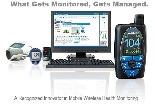Self-Tracking Through SMS
Gary Wolf
November 8, 2008
Just a quick follow up to the last post about Tweet What You Eat, inspired again by Flowing Data and by a telling anecdote from a recent health conference, where I concluded that ubiquitous self-tracking is coming, but perhaps not from the direction expected by many health professionals.
At the conference I met the CEO of health informatics company who had a seemingly clever idea about how to collect patient data, track compliance with medical recommendations (prescriptions, glucose monitoring, etc.), and provide reminders to patients and reports to their doctors. His name is Kent Dicks, and the company is called MedApps. Dicks is smart and well informed, and is working hard to make ubiquitous tracking work.
 MedApps uses early generation wireless, where the connectivity costs are cheap and the bandwidth meager. The business idea was the create a general device, basically a wireless transmitter, that would transfer data over the cellular networks, and then arm this devices with a bunch of different customized dongles to connect to all different types of measurement tools: scale, glucose monitor, pedometer, cardiac monitor, etc. Owning a general, proprietary solution to an admittedly messy problem justifies a multi-hundred dollar price tag. After all, this is meant to be a medical system, approved by the FDA and paid for by the great mother of health care business plans: insurance reimbursements. Patients would comply with self-tracking because they wanted to cooperate with the regimen given to them by their doctors. If added motivation was needed, they could be influenced by insurance discounts, or even paycheck bonuses or penalties in the context of corporate “wellness” programs.
MedApps uses early generation wireless, where the connectivity costs are cheap and the bandwidth meager. The business idea was the create a general device, basically a wireless transmitter, that would transfer data over the cellular networks, and then arm this devices with a bunch of different customized dongles to connect to all different types of measurement tools: scale, glucose monitor, pedometer, cardiac monitor, etc. Owning a general, proprietary solution to an admittedly messy problem justifies a multi-hundred dollar price tag. After all, this is meant to be a medical system, approved by the FDA and paid for by the great mother of health care business plans: insurance reimbursements. Patients would comply with self-tracking because they wanted to cooperate with the regimen given to them by their doctors. If added motivation was needed, they could be influenced by insurance discounts, or even paycheck bonuses or penalties in the context of corporate “wellness” programs.
I long for a general solution to the data collection problem, but this approach strikes me as somewhat wrong headed. It is serving the labyrinthine business system, rather than the more straightforward and obvious needs of people. (People who are not necessarily “patients.”) Meanwhile, companies like Zume Life are just having people read their data into a digital recorder and transcribing the reports, skilled users like Nathan Yau are writing Twitter bots, and small scale entrepreneurs like Alex Rossi are creating Web based services like Tweet What You Eat that collect reports via SMS. Data is beginning to flow through and around the highly disorganized and loosely connected networks that already exist, and as this flow increases I wonder if the more fully engineered and FDA approved systems will simply become irrelevant. And the bigger theme is also relevant. Either self-tracking will be understood as a good thing, and many people will want to do it, or it will not be so understood, and all the inducements in the world will probably not be enough to motivate them.
To get a sense of how low the threshold is for programmers to build a
simple system to gather personal data, take a look at Nathan’s recent
post on Flowing Data about how to make your own Twitter bot. Also read
the comments. When I did, I thought: “Pioneering users can make popular programs… This problem is on the way to being solved… ”


